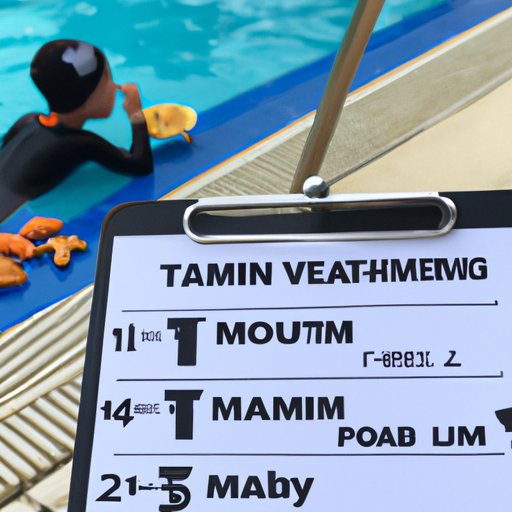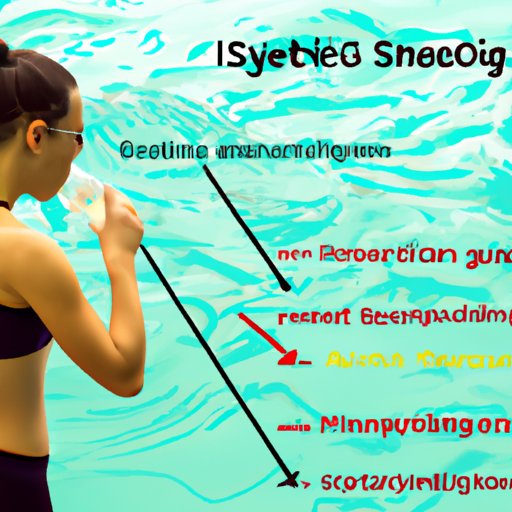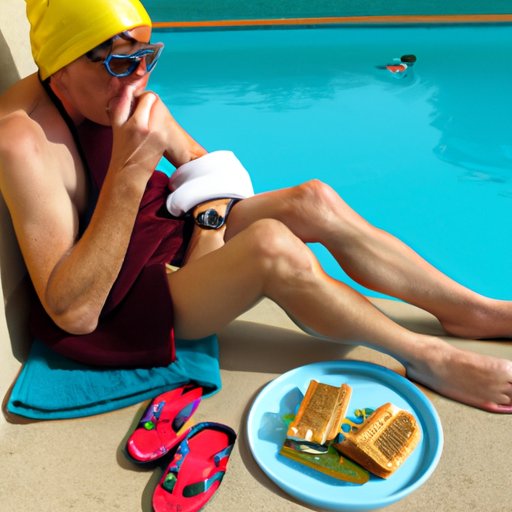Introduction
Swimming is a popular form of exercise that can provide many health benefits. However, it is important to be aware of the potential risks associated with swimming after eating. This article provides an in-depth exploration of the topic, including how to calculate the recommended wait time after eating before swimming, exploring the effects of digestion on swimming performance, and examining the benefits of taking a break after eating before swimming.

How to Calculate the Recommended Wait Time After Eating Before Swimming
The amount of time needed to wait after eating before swimming will depend on several factors, such as the type and size of the meal consumed. Generally speaking, it is recommended to wait at least 30 minutes after eating before swimming. This allows the body to digest the food and helps to reduce the risk of stomach cramps or nausea while in the water.
In order to get a more accurate estimate of the amount of time needed, it is important to consider the size and type of food that was eaten. A larger meal may require a longer wait time, while a light snack may only require a 15-20 minute wait. Additionally, high-fat foods should be avoided prior to swimming, as they are more difficult to digest and can increase the risk of stomach upset or cramping.

Exploring the Effects of Digestion on Swimming Performance
It is important to understand the effects of digestion on swimming performance. When swimming, the body requires a large amount of energy to move through the water. If the digestive system is not working properly, this can lead to fatigue or dizziness due to a lack of energy. Additionally, if the stomach is full, it can be uncomfortable and can even lead to vomiting.
Therefore, it is important to allow the body enough time to digest the food before entering the water. Taking a break after eating can help to ensure that the body has enough energy for swimming and can reduce the risk of any discomfort or nausea.
Strategies for Minimizing Discomfort When Swimming After Eating
In addition to allowing the body enough time to digest, there are several strategies that can help to minimize discomfort when swimming after eating. Firstly, it is important to stay properly hydrated. Dehydration can cause fatigue, making it more difficult to swim. Secondly, it is best to eat light meals prior to swimming, as heavy meals can be difficult to digest and can cause stomach cramps. Finally, it is important to avoid high-fat foods, as these can be difficult to digest and can increase the risk of stomach upset.

Examining the Benefits of Taking a Break After Eating Before Swimming
Taking a break after eating before swimming can provide numerous benefits. Firstly, it can help to improve swimming performance, as the body will have more energy to move through the water. Additionally, it can reduce the risk of feeling dizzy or fatigued while in the water, as the body will have had enough time to digest the food.
Conclusion
In conclusion, it is important to be aware of the health risks associated with swimming after eating. Taking a break after eating can help to improve swimming performance, reduce the risk of stomach cramps or nausea, and minimize the risk of feeling dizzy or fatigued while in the water. The amount of time needed to wait before swimming will depend on the type and size of the meal consumed, but generally it is recommended to wait at least 30 minutes after eating before entering the water.
By following these tips and guidelines, swimmers can enjoy all the benefits of swimming without having to worry about the risks associated with swimming after eating.
(Note: Is this article not meeting your expectations? Do you have knowledge or insights to share? Unlock new opportunities and expand your reach by joining our authors team. Click Registration to join us and share your expertise with our readers.)
